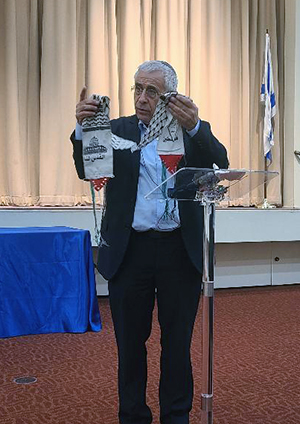

LA JOLLA, California – More than 200 attendees gathered at Congregation Beth El in La Jolla on Wednesday, Nov. 20, to hear a thought-provoking lecture by Dr. Mordechai Kedar, an expert in Middle Eastern affairs. Organized by Pamela Nathen, President of SAJAC (South African Jewish American Community) and CAN (Combat Antisemitism Now), the event highlighted Kedar’s deep understanding of the region’s complexities, drawn from his distinguished career in military intelligence and academia. Security was present to ensure the safety of attendees, and the lecture proceeded peacefully without any protests.
Kedar’s presentation, titled “Israel in a Changing Middle East,” explored the cultural, religious, and political dynamics that shape the region. Drawing on his 25+ years of experience in IDF military intelligence and his extensive academic research, he provided attendees with a nuanced framework to analyze the Middle East. His insights bridged the historic and contemporary, offering an understanding of how factors such as tribalism, Islam, and modernism continuously influence the region’s trajectory.
A key focus of the lecture was the contrasting cultural paradigms of the Middle East and the West. Kedar noted how individualism dominates Western culture, while the Middle East prioritizes family, clan, and tribal affiliations as the bedrock of society. This fundamental difference affects everything from social structures to political alliances. He also discussed the profound role of religion in the Middle East, often serving as the primary determinant in personal and professional decisions—a stark contrast to the relatively secularized approach seen in many Western countries.
Kedar elaborated on how tribalism remains deeply entrenched in Middle Eastern society. The desert environment historically necessitated strong familial bonds for survival, fostering collective loyalty and often perpetuating cycles of revenge and honor killings. He explained how Islam sought to unify tribes under a single religious banner but ultimately failed to abolish clannishness. The three dominant cultural forces—tribalism, Islam, and modernism—continue to pull the region in different directions.
Modernism’s influence, though limited, has brought some societal changes. Kedar shared fascinating historical anecdotes, such as the introduction of the printing press to Egypt in the 19th century and early efforts toward women’s education and liberation. However, he noted that modern devices like cell phones, which grant individual autonomy, are viewed with suspicion by many in the Islamic world, as they challenge patriarchal control.
Turning to current events, Kedar addressed the ongoing conflicts between Israel and entities like Hamas and Hezbollah. He emphasized that in the Middle East, peace is extended only to those who demonstrate power and deterrence. He stressed the importance of Israel maintaining internal stability and a strong image to secure even temporary peace in a region fraught with deep-rooted cultural and religious divisions.
Kedar also shed light on the complex alliances and rivalries shaping the region. He highlighted the strained relationship between Iran and its proxies, such as Hamas and Hezbollah, which has been exacerbated by Israel’s recent military successes. He predicted that the Middle East’s geopolitical landscape could shift further after January 20, aligning with potential changes in U.S. administration policies.
Following the lecture, attendees actively participated in a dynamic Q&A session that touched on a wide range of topics. Kedar addressed questions with candor and depth, offering insights into both historical and contemporary issues:
– Zionism and Israeli Society: He discussed the longstanding division between religious/conservative and secular/nationalist ideologies within Zionism, noting their cooperation in founding the state. Today, demographic shifts, including the growth of Haredi society and shrinking secular population, have moved the Knesset further right, while liberals continue to dominate areas like media, arts, and education.
– Military Readiness on October 7: Responding to concerns about the military’s performance, Kedar attributed weaknesses to religious exemptions and an imbalance in military prioritization.
– Netanyahu’s Leadership: When asked about Prime Minister Netanyahu’s effectiveness, Kedar quipped that comparisons require alternatives, and one cannot compare “one thing against nothing.”
– Iran-Russia Relations: He characterized their alliance as complex and transactional, highlighting cultural differences and mutual needs, such as Iran supplying drones to Russia while relying on Russian military technology.
– Hostages Held by Hamas: Kedar lamented the lack of information about hostages, attributing it to Hamas’ strategy of using them as human shields to prolong conflict and maintain leverage.
– Intelligence and the October 7 Attack: Kedar reflected on past intelligence practices versus present challenges. He criticized assumptions that Hamas would act as a rational state-builder, emphasizing their jihadist ideology and reliance on deception.
– Arab-Israeli Dynamics Post-Attack: He noted subdued responses from Israel’s Arab population, partly due to fear stemming from Hamas’ brutality toward Arab victims and cultural projection of revenge dynamics onto Israeli Jews.
– Demographic Trends: Kedar highlighted the declining Arab birth rate in Israel compared to a rising Jewish birthrate, particularly among Modern Orthodox and Haredi communities.
– Peace Negotiations: He advocated for clan-based governance models, referencing the UAE’s eight-state solution proposal, and criticized both Hamas and the PLO for prioritizing Israel’s destruction over peace.
– Media and Public Opinion: Stressing the battle for global hearts and minds, Kedar identified mainstream media as a significant obstacle to supporting Israel’s right to exist. He encouraged attendees to explore alternative platforms like the Newsrael app for reliable information.
The session continued until 9:30 p.m., when Pamela Nathen had to conclude the event due to security staff needing to leave. The enthusiastic engagement from attendees underscored the importance and relevance of Kedar’s insights.
*
Miriam Gershenson is a freelance writer who enjoys covering events and promoting others. She would like to acknowledge her friend, Nicolau Aristides M A Sparer, who flew in from the Bay Area for the day specifically for this lecture. “Luckily, Nicolau took great notes which aided me in writing this article.”